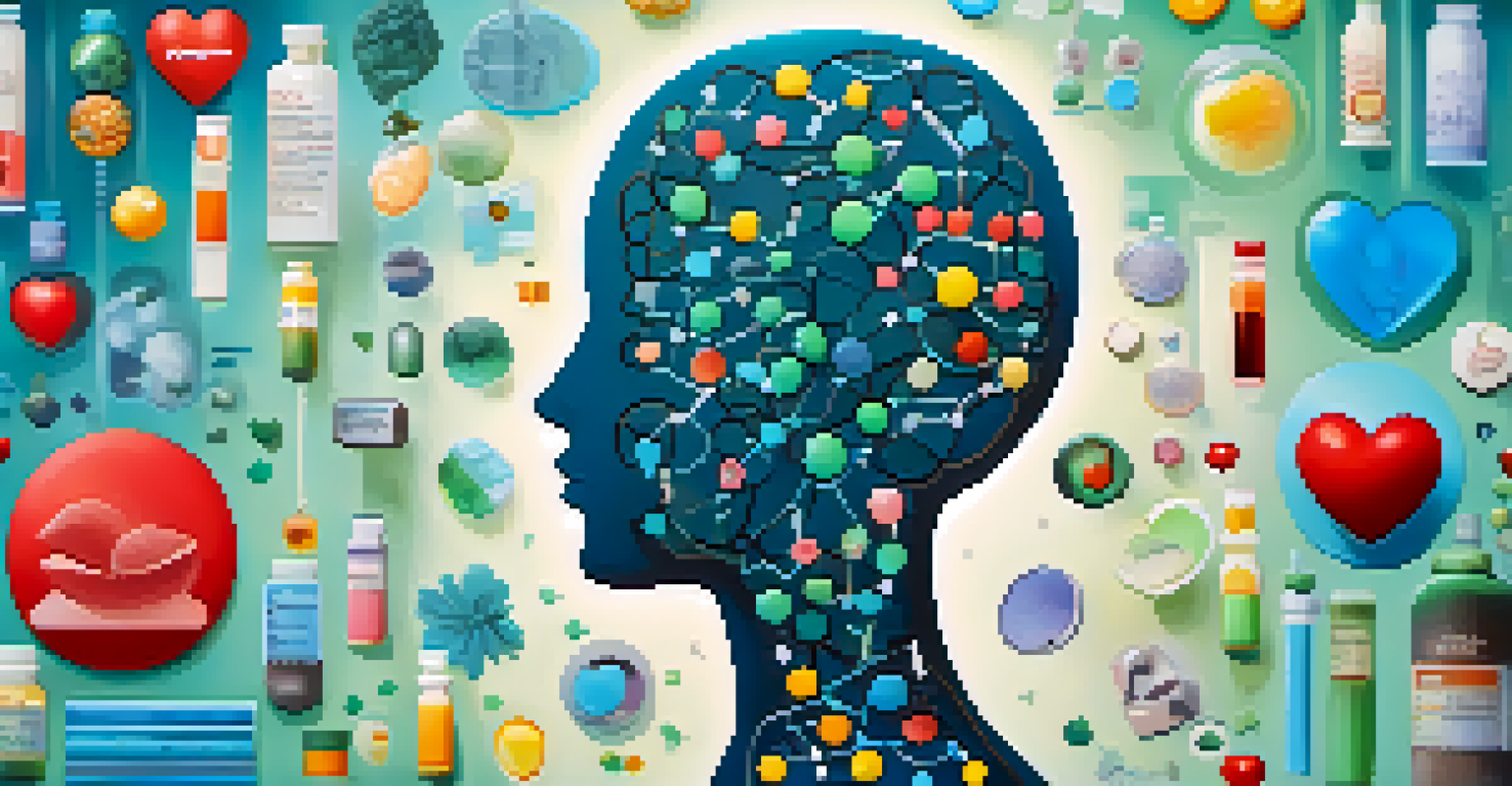Understanding Precision Medicine: A New Era in Healthcare

What is Precision Medicine and Why Does It Matter?
Precision medicine refers to a tailored approach to healthcare that considers individual differences in genetics, environment, and lifestyle. Unlike traditional medicine that often uses a one-size-fits-all method, precision medicine aims to customize treatments for each patient. This approach not only improves the effectiveness of treatments but also minimizes unwanted side effects, making healthcare more efficient and effective.
Precision medicine is the future of healthcare. It's about understanding the individual to provide tailored treatments that lead to better outcomes.
Think of precision medicine like a tailored suit versus a generic one. Just as a custom suit fits an individual perfectly, precision medicine fits treatments to the unique genetic makeup of each patient. This personalized approach is particularly crucial in areas like oncology, where two patients with the same type of cancer might respond differently to standard therapies due to their genetic differences.
As we deepen our understanding of the human genome and harness technology, the potential for precision medicine continues to grow. This new era in healthcare promises not just better outcomes for patients but also a more comprehensive understanding of diseases at a molecular level.
The Role of Genetics in Precision Medicine
Genetics plays a pivotal role in precision medicine by providing insights into how our bodies respond to treatments. By analyzing an individual's genetic profile, healthcare providers can identify which medications are likely to be most effective. This approach shifts the focus from trial-and-error prescribing to a more informed decision-making process.

For example, certain genetic markers can indicate how a patient might metabolize a drug, which is crucial in avoiding adverse reactions. Imagine trying to find the right key for a lock; understanding someone's genetic makeup helps ensure that the right 'key'—or treatment—is chosen from the start. This genetic insight ultimately leads to more successful outcomes and a better patient experience.
Precision Medicine Personalizes Care
This approach tailors treatments based on individual genetic, environmental, and lifestyle factors to improve effectiveness and reduce side effects.
As research advances, we're discovering more about the intricate relationship between our genes and health. This knowledge not only informs treatment but also aids in prevention, allowing individuals to make informed lifestyle choices based on their genetic predispositions.
How Precision Medicine is Changing Cancer Treatment
One of the most significant impacts of precision medicine has been in the field of oncology. Traditional cancer treatments often involve chemotherapy and radiation, which can be harsh and affect healthy cells. However, precision medicine allows for targeted therapies that specifically attack cancer cells while sparing normal cells, leading to fewer side effects.
The key to precision medicine is the ability to analyze and interpret vast amounts of data, leading to insights that can transform patient care.
For instance, drugs like trastuzumab are designed for patients with HER2-positive breast cancer, showcasing how specific genetic markers can dictate treatment choices. This tailored approach not only improves survival rates but also enhances the overall quality of life for cancer patients. It's like having a heat-seeking missile that knows exactly where to go instead of a bomb that might cause collateral damage.
Furthermore, ongoing research is continually uncovering new targets for therapies, making precision medicine a dynamic and evolving field. As we learn more about the genetic makeup of various cancers, the possibilities for personalized treatment expand, offering hope to many.
The Importance of Data in Precision Medicine
Data collection and analysis are at the heart of precision medicine. Large datasets from genetic testing, clinical trials, and patient outcomes help researchers identify patterns and correlations that can inform treatment strategies. This data-driven approach enables healthcare providers to make better decisions based on real-world evidence.
Imagine trying to solve a puzzle with only a few pieces; having access to comprehensive data is like having all the pieces laid out in front of you. The more data we collect, the clearer the picture becomes, allowing for more accurate predictions and personalized treatment plans. This is especially important in chronic conditions where multiple factors can influence patient health.
Genetics Drives Treatment Decisions
By analyzing genetic profiles, healthcare providers can make informed decisions about the most effective medications for each patient, moving away from trial-and-error methods.
Moreover, advancements in artificial intelligence and machine learning are enhancing our ability to analyze this data. These technologies can sift through vast amounts of information quickly, uncovering insights that would take humans much longer to find. As we harness these tools, the future of precision medicine looks brighter and more promising.
Challenges Facing Precision Medicine Adoption
Despite its potential, precision medicine faces several challenges that hinder widespread adoption. One significant barrier is the cost associated with genetic testing and targeted therapies, which can be prohibitively expensive for many patients. Insurance coverage also varies, leading to disparities in access to these advanced treatments.
Additionally, there are concerns about privacy and data security, as the collection of genetic data raises questions about who has access to this information and how it is used. It's essential to establish robust guidelines to protect patient privacy while still allowing for valuable research to continue. Think of it like a double-edged sword; we need to balance innovation with ethical considerations.
Furthermore, there is a need for increased education among healthcare providers regarding precision medicine. As this field evolves, training and resources must be provided to ensure that medical professionals are equipped to implement these personalized strategies effectively.
The Future of Precision Medicine: What to Expect
Looking ahead, the future of precision medicine holds tremendous promise. As technology continues to evolve, we can expect more advanced tools for genetic analysis and data interpretation. These innovations will likely lead to even more personalized treatment options, making healthcare more effective and patient-centered.
One exciting area is the integration of wearable technology and real-time health monitoring. Imagine being able to continuously track your health data and receive personalized insights that guide your lifestyle choices and healthcare decisions. This proactive approach could revolutionize how we manage chronic diseases and promote overall well-being.
Data Fuels Precision Medicine Growth
Comprehensive data collection and advanced technologies enable better insights and personalized treatment plans, driving innovation in healthcare.
Moreover, collaboration among researchers, healthcare providers, and patients will be crucial in advancing precision medicine. By working together and sharing knowledge, we can unlock new insights and push the boundaries of what’s possible in healthcare. The journey ahead is filled with potential, and we are just beginning to scratch the surface.
Conclusion: Embracing Precision Medicine for Better Health
In conclusion, precision medicine represents a transformative shift in how we approach healthcare. By focusing on the individual rather than a generalized population, we can create more effective treatment plans that cater to each patient's unique needs. This personalized approach not only enhances outcomes but also fosters a sense of empowerment for patients.
As we continue to navigate this new era in healthcare, it's vital to remain informed and engaged. Patients should advocate for their health and seek out precision medicine options that may be available to them. Just as a well-informed consumer makes better choices, an informed patient can take charge of their health journey.

Ultimately, embracing precision medicine is about harnessing the power of knowledge and technology to create a healthier future for everyone. By prioritizing individual differences and investing in the future of healthcare, we can make significant strides toward improving lives and enhancing the overall well-being of our communities.